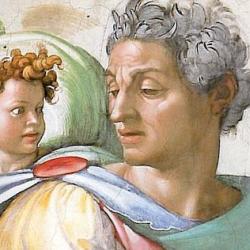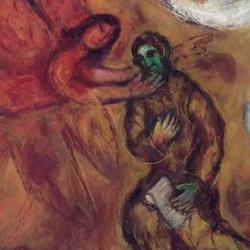INTRODUCTION
In the center of Isaiah’s “little apocalypse” is a vision of a ruined and restored city, and at the center of the center is a promise that the Lord will prepare a table for His people, and a series of songs of praise (25:1-2, 9; 26:1-6).
THE TEXT
“O Lord, You are my God. I will exalt You, I will praise Your name, for You have done wonderful things; Your counsels of old are faithfulness and truth. For You have made a city a ruin, a fortified city a ruin, a palace of foreigners to be a city no more; it will never be rebuilt. Therefore the strong people will glorify You; the city of the terrible nations will fear You . . . .” (Isaiah 25:1-26:6).
REFUGE FOR THE WEAK
Isaiah 25 starts out with Psalm-like praise to Yahweh (cf. Psalm 31:14; 62:1; 118:28; 140:6; 143:10). The prophet claims Yahweh as his God, and praises Him for the “wonderful things” he has done (Psalm 98:1; 119:1), all of which Yahweh planned and executed with faithfulness (v. 1). Verse 2 takes a turn: The prophet sings a Psalm of praise because Yahweh has cast down a city and palace so thoroughly that it will never be rebuilt. This is a devastating judgment, but the effect is to turn the strong to the Lord (v. 3) and to lead the weak and helpless to praise God as a refuge and tower of defense (vv. 4-5). Whatever city is toppled, it is like Babel and Sodom, a city of oppression whose destruction means liberation for the oppressed.
BANQUET OF LIFE
Having thrown down the wicked city, Yahweh prepares a victory celebration for “all peoples” (v. 6). “This mountain” is the Lord’s own mountain, first Sinai (Exodus 3:12; Deuteronomy 1:5; 2:3; Matthew 17:20; 21:21) but finally Zion, the mountain that the Lord has chosen. It will be a feast of meat and wine, like a great sacrificial fast (v. 6). Yahweh Himself participates in the feast, but He eats not meat and wine but will swallow the “veil” that covers the people. This refers, in part, to the veil of the temple that separates Israel and the nations from Yahweh’s presence (v. 7), but it also refers to the covering of death that overshadows all nations (v. 8). Ultimately, this mountain feast is the feast of the Lord’s Supper, the victory feast that we celebrate after Jesus has swallowed death in His resurrection (1 Corinthians 15:54). In swallowing death on the cross, the God of life absorbs death into Himself and transfigures it into life. When He has swallowed death, God will also remove all the evil consequences of death, drying every tear (v. 8). The feast is filled with songs of praise for God’s salvation (v. 9). “All peoples” join the feast, but not everyone from every nation. Outside is Moab, trampled down like straw and manure (vv. 10-12).
STRONG CITY
The feast on the mountain is the seed from which a new city grows. At the beginning of chapter 25, a city is destroyed. At the beginning of the next chapter, God establishes a new city. Its walls and gates allow the righteous to enter but keep out the wicked, and in that city is perfect peace (vv. 1-3; cf. Revelation 21:10-27). God is the Rocky foundation of the city (v. 4; cf. Matthew 7:24-27). Yahweh the Rock is also an exodus motif (Deuteronomy 32:4, 15, 18), since Yahweh is the Rock that followed Israel in the wilderness and provided water. That Rock will found the new city. The high and proud will brought low. Their city will be cast to the dust of death (v. 5), trampled under the feet of the afflicted and helpless, now turned victors.










